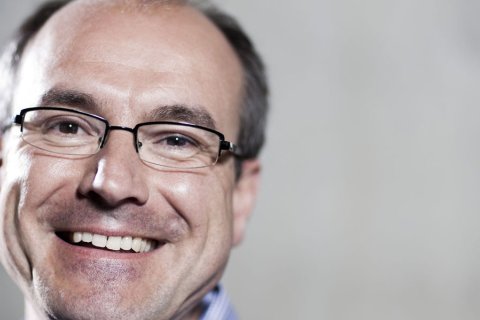Top researcher and Spinoza prize winner receives € 50,000 award for innovative education
‘We need people from different backgrounds who speak each others’ language’

Prof. dr. ir. Bert Weckhuysen (Chemistry) has been awarded a Comenius programme Teaching Fellow grant, which the Minister of Education presents to encourage excellent and inspiring teaching. The Spinoza Prize winner aims to use the grant to contribute to innovation in education.

“I’m extremely proud, and it feels like when I received my first research grant”, says Prof. Weckhuysen. The grant will be spent on a new research project called Da Vinci, in which students from different fields work on solutions to social problems together. By working in interdisciplinary teams, students are expected to provide innovative solutions to sustainability-related problems. Weckhuysen cannot wait to get to work with the students and his colleagues, Brianne McGonigle (Law) and Prof. dr. Appy Sluijs (Geoscience).
“Hopefully, that will create some tension, which we can then convert into positive energy”
Teaching for society
“We need people from different backgrounds who speak each others’ languages, and I mean more than just polite conversation. Only then can we work on solving social issues dealing with circular waste flows, transport, economics, and sustainability.” Next year, students will use Design Thinking tools to work on issues that they choose themselves. With only limited knowledge of one another’s disciplines, the students will have to collaborate and eventually present their solution in the form of a prototype to an external partner, organisation, and/or business. “Creating something tangible lets people test themselves, get out of their comfort zones, and become acquainted with other fields and points of view. And in the process, they’ll be confronted with new problems, limitations - and themselves. Hopefully, that will create some tension, which we can then convert into positive energy”, the chemist explains. Failure will also play an important role in the process, which is unusual in that there is normally no room for failure in academic research. The idea is that failure can actually lead to new discoveries and solutions.
“I believe that education can provide added value for academics, students, and social partners”
- (Kim Zunderdorp)
Idea becomes reality
The idea for the Da Vinci Project came up during a networking lunch between Bert Weckhuysen and policy officer Kim Zunderdorp. At the time, Zunderdorp was busy setting up the Community Service Learning programme, in which the university encourages education that offers students opportunities to be active in society. As co-initiator, Zunderdorp got the right people involved in the project, including Appy Sluys and Brianne McGonigle.
Similar to his own career
The Da Vinci project is a good reflection of Weckhuysen’s own career, where meetings with people from governments, businesses, and research administrators result in new combinations of skills.
Utrecht University aims to educate students to become involved citizens who are aware of social developments and are able and willing to make a useful contribution. In order to realise that ambition, the university has set up the Community Service Learning programme. Community Service Learning is an experience-based teaching method in which students, lecturers, and external partners work together to address social issues. The Da Vinci Project is one of the ways that the university puts the method into practice.

